Argentina Allows Some Crew Of Grounded Iran-Linked Plane To Leave
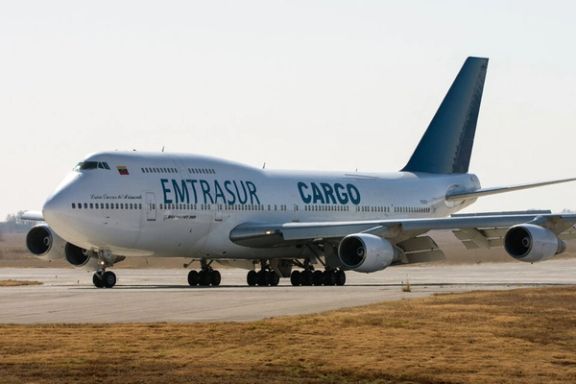
An Argentine judge investigating the Iranian and Venezuelan crew of a cargo plane grounded in Buenos Aires over IRGC links has allowed some of them to leave.

An Argentine judge investigating the Iranian and Venezuelan crew of a cargo plane grounded in Buenos Aires over IRGC links has allowed some of them to leave.
Federal judge Federico Villena authorized Monday the departure of 12 of the 19 people who were onboard, ordering four Iranians and three Venezuelans to be retained in Argentina.
He said there are still elements to be investigated regarding the Iranian pilot Gholamrez Ghasemi, designated by the Argentine intelligence service as a member of Iran’s Revolutionary Guard.
Registered as a Venezuelan cargo plane, the aircraft was used by the Iranian company Mahan Air and transported a group of Iranian officials, including Ghasemi, a senior executive of the airline Qeshm Fars Air, who is a member of the IRGC and a former board member of Fars Air Qeshm who stands accused of transporting weapons for Hezbollah during the civil war in Syria.
The Boeing 747 in question arrived in Argentina from Mexico on June 6, with 14 Venezuelans and five Iranians on board, before trying to fly to Uruguay two days later, where it was refused entry following a formal warning from Paraguayan intelligence.”
In July, Paraguayan President Mario Abdo Benítez said one of the crew had travelled to Cuba for plastic surgery to “change his face.”
In June, Gerardo Milman, an Argentine lawmaker, told Iran International that Iranians aboard the Venezuelan plane planned “attacks on human targets.” Contrary to Iran’s claim June 13 that the plane was not owned by an Iranian company, Milman said the pilot was “a senior official of Qods (Quds) force,” Tehran’s extraterritorial intelligence and secret ops outfit listed as a terrorist organization by the United States.
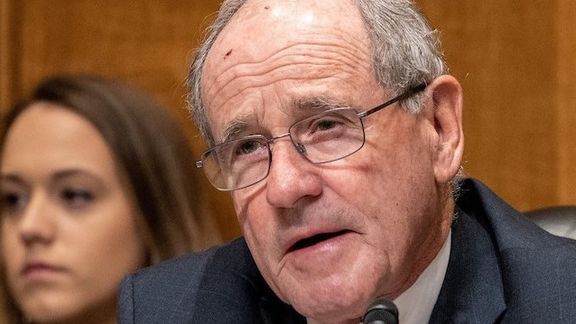
A senior US Republican senator says the insistence by the European Union and President Joe Biden on rejoining Iran’s nuclear deal – or the JCPOA – is a fool’s errand.
Senate Foreign Relations Committee Ranking Member Jim Risch (R-Idaho) made the remarks in a tweet on Monday, criticizing the proponents of restoring the nuclear agreement despite everything the Islamic Republic is doing.
“From assassination plots of former US officials, attacks on Americans, to disabling IAEA (International Atomic Energy Agency) monitors and continued support for regional terrorism... it’s time to walk away from a bad deal with Iran,” he said.
Recently, media with links to Iran’s Revolutionary Guard have suggested that Iran may build nuclear warheads “in the shortest possible time” if attacked by the US or Israel. Iran has now enriched enough uranium to 60 percent that if further enriched to 90 percent, the fissile material will be sufficient for a nuclear bomb within a few weeks.
Some Iranian officials have suggested that Iran is a nuclear threshold state but does not want or need a nuclear weapon and is only enriching uranium for energy and other civilian uses. They often add that Iran's Supreme Leader has declared that the production, stockpiling and use of nuclear weapons are all forbidden under Islam (haram), in a fatwa, or religious edict, first revealed in a statement from Iran to the IAEA in Vienna in August 2005.
On Tuesday, Iranian lawmaker Mohammad-Reza Sabbaghian Bafghi said, "We will ask the Supreme Leader to change his fatwa and strategy on the prohibition of producing nuclear weapons if the enemies of the Islamic Republic continue their threats.”
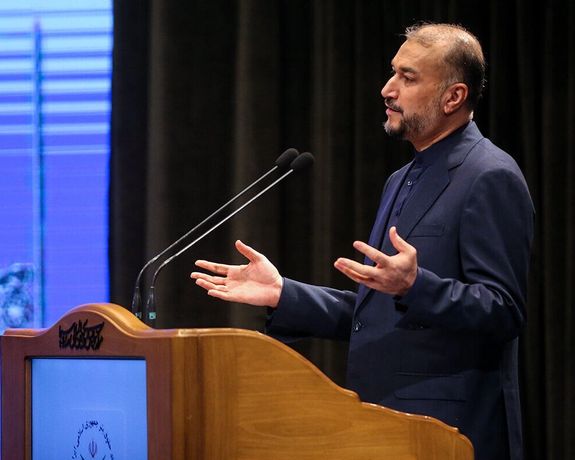
Iran’s foreign minister says Tehran’s move to feed fuel into “hundreds” more centrifuges to enrich uranium was a response to new US sanctions on entities supporting oil and petrochemical trade.
Hossein Amir-Abdollahian said on Tuesday that “In response to the new US sanctions, we started pumping gas into hundreds of new generation centrifuges. We acted based on the decision made. The Americans shouldn’t think they can get concessions from Iran at the negotiating table with these measures.”
He described it as startling that the US proposed a resolution in the International Atomic Energy Agency while “we repeatedly received goodwill messages from US President Joe Biden through mediators.”
On Monday, August 1, the US Treasury sanctioned several companies it said were involved in the sale of Iranian petroleum and petrochemicals.
Announcing Tehran’s latest steps beyond the limits of the 2015 Iran nuclear deal, the JCPOA (Joint Comprehensive Plan of Action), Behrouz Kamalvandi, spokesman for the Atomic Energy Organization of Iran, said on Monday that Iran has started pumping uranium gas into hundreds of IR-1s & IR-6 centrifuges as part of its plan to reach uranium enrichment capacity of at least 190,000 SWU (separative work units), a measurement of efficiency in enrichment. Under the JCPOA Iran was allowed only 6,104 SWU and no IR-6s.
Amir-Abdollahian added that Tehran is reviewing the recent proposals by the European Union to take forward talks over renewing the 2015 Iran nuclear deal. The US State Department spokesman has said Washington also is reviewing proposals made by Joseph Borrell, the European Union foreign policy chief.
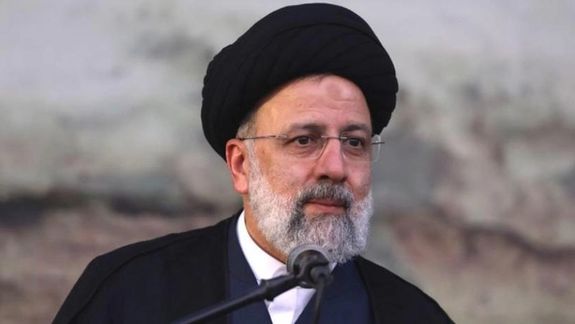
Iranian President Ebrahim Raisi is slated to travel to New York for the 77th session of the UN General Assembly in September, his first since he did not attend the event last year.
In his weekly press conference on Tuesday, Iranian government spokesman Ali Bahadori Jahromi said that preliminary plans have been made for Raisi’s participation in the United Nations annual gathering.
The UNGA 77 is scheduled to open on September 13 in New York, and the first day of the high-level General Debate will be on 20 September. On the agenda of this year’s event are a meeting to mark the commemoration of the 30th anniversary of the adoption of the Declaration on the Rights of Persons Belonging to National or Ethnic, Religious and Linguistic Minorities on September 21 and a plenary meeting to commemorate the International Day for the Total Elimination of Nuclear Weapons on September 26.
Raisi – who is on the US and European sanctions list -- did not attend the high-level summit in the previous year, and only delivered a video speech.
He is probably among the most controversial among the Islamic Republic presidents to attend the General Assembly as he was a member of a "death committee" that issued orders to kill political prisoners in 1988. A witness in the Swedish trial of Hamid Noury (Nouri), an ex-judicial official and jailor, over alleged involvement in Iran’s 1988 prison executions named Raisi as one of the officials directly involved in the massacre.
Earlier in the year, prominent former UN officials called for a UN investigation into the 1988 "massacre" of political prisoners in Iran, including Raisi’s role, at that time.
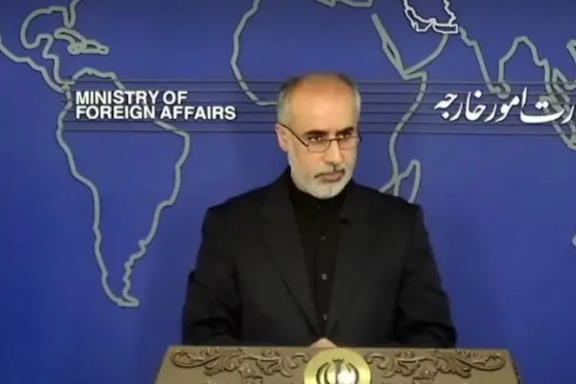
Iran says the US move to impose fresh sanctions at a time when Iranian people have suffered heavy damage and losses because of recent floods proves that their sympathy is mere hypocrisy.
Foreign Ministry spokesman Nasser Kanaani made the remarks on Tuesday, a day after US Treasury and State Department imposed sanctions on six companies, four based in Hong Kong, one in Singapore, and one in the United Arab Emirates (UAE).
The companies were subjected to sanctions over their links with Iran's government-owned Persian Gulf Petrochemical Industry Commercial company. The Treasury also blacklisted Glory Harvest LPG Tanker for links to Iran. The US said the firms have helped Iran sell tens of millions of dollars in oil and petrochemical products to East Asian countries.
Kanaani was referring to a recent message of condolences by US Special Envoy for Iran Robert Malley who expressed sympathy with the victims and their loved ones affected by the devastating flash floods and landslides throughout Iran.
The Iranian spokesman added that the current US administration’s attitude towards the Islamic Republic does not differ from its predecessor, despite the fact that it has repeatedly dismissed Trump administration’s “maximum pressure” campaign against Iran as a failure.
Despite 16 months of negotiations to revive the JCPOA, Iran has not accepted a proposal, which the US says is on the table. After lax enforcement of sanctions since early 2021, Washington has signaled a new approach.
Kanaani said that the White House’s addiction to imposing sanctions and using them as political leverage exposes the United States’ “imperialistic nature.”
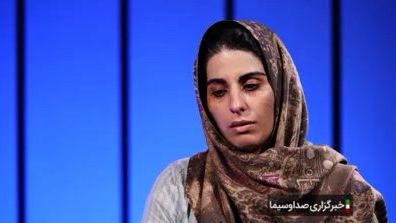
Iranian activists have taken to social media to condemn the state-run television for airing ‘forced confessions’ of a detained anti-hijab protester last week.
The state-run television (IRIB) on Sundayaired the so-called ‘confessions’ of Sepideh Rashno, a 28-year-old artist, writer and editor, who was arrested on July 16, after a video of her quarrel with a woman enforcing hijab rules – identified as Rayeheh Rabi’i -- went viral.
In the video Rabi’i, who was fully covered by a long, black ‘chador’ – which is typical of the supporters of the Islamic Republic – is seen shouting at Rashno who had unveiled in a city bus. The quarrel became so frantic that other passengers intervened and kicked the hijab enforcer out of the bus.
Iran’s state media and media outlets affiliated with the Revolutionary Guards (IRGC) have been publishing videos of forced confessions from women who are arrested over their participation in an ongoing anti-hijab campaign.
In the forced confession under detention shown by the IRIB Sunday, Rashno says she regrets her confrontation with the hijab enforcer and posting her video on social media and that she “begged” US-based anti-hijab activist Masih Alinejad to remove the video of the encounter from social media.
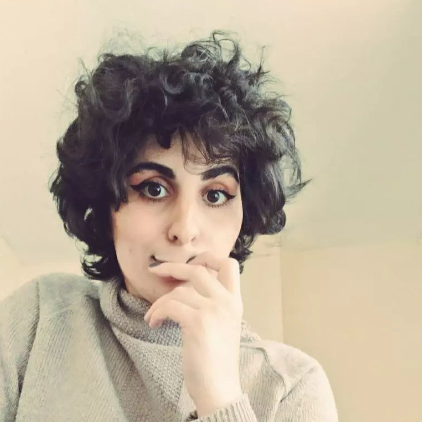
Rashno has reportedly been in detention at the IRGC ward of Tehran’s Evin Prison since her arrest without any contact with her family or access to a lawyer.
In a tweet Sunday, Alinejad alleged that Rashno was tortured and forced to denounce herself and speak against her. “She’s a hero fighting for freedom for all women, for our dignity. I call on the international community to support Sepideh Reshnou,” Alinejad wrote.
While all these were taking place, a man was arrested outside Alinejad's home in Brooklyn, NY with a loaded AK-47 assault rifle, after being seen loitering for two days and trying to get into her home.
Social media users have pointed out that in the video aired Sunday Rashnou appears to be wearing a heavy layer of makeup to cover up bruises on her face, particularly above her right eye, and looks very tired and worn out resulting from possible physical and psychological torture.
Armin Soleimani, journalist, in a tweet Sunday said by torturing Rashno and airing her ‘confession’ on the state television, authorities aimed at intimidating anti-hijab activists and protesters.
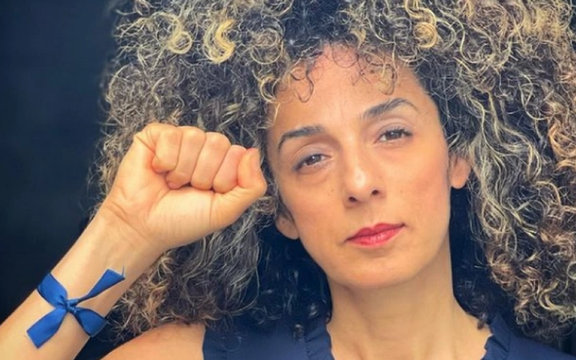
Iran’s Supreme Leader Ali Khamenei claimed last week that the anti-hijab movement is nothing but a Western plot against the Islamic Republic, adding that in his view the Islamic Republic does not need to defend itself about issues related to women including the hijab but should rather be aggressive and attack the West for turning women into a “commodity”.
Rights activists allege that the Islamic Republic systematically uses torture and broadcasts torture-tainted ‘confessions’ of activists, politicians, and even ordinary criminals against themselves and others on state television to intimidate their peers and the public.
“Such confessions may have worked in the early days of the revolution but fortunately has lost its [desired] impact now due to being repeatedly used for all sorts of things and have even made the incompetent security organs the butt of jokes,” Maziar (Mazyar) Ebrahimi, a businessman who was tortured to ‘confess’ that he had been spying for Israel and was involved in the assassination of Iranian nuclear scientists in 2012 tweeted about the airing of Rashno’s confessions.
On July 12, following a call by women’s rights activists for civil disobedience with the hashtag of ‘No2Hijab’ social media exploded with dozens of videos and photos of women unveiling in public.
Iran’s government which is now fully controlled by hardliners has adopted a harsher than usual approach in enforcing hijab in the streets and government affiliated institutions, amid economic crisis and hardship for tens of millions. Government and military officials have warned the population against disobeying hijab rules and the morality police hijab enforcement patrols have detained many women, sometimes violently, on the streets.